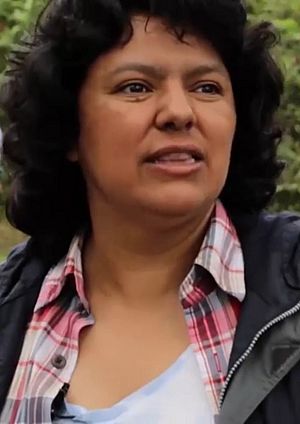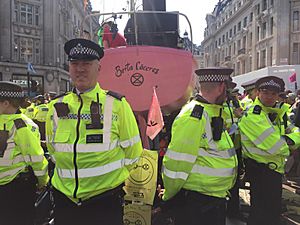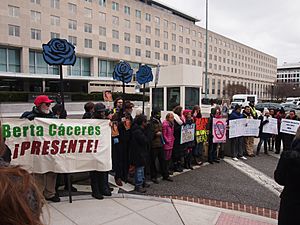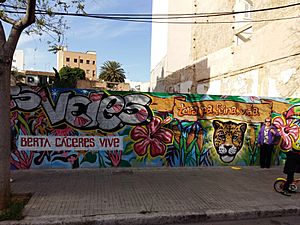Berta Cáceres facts for kids
Quick facts for kids
Berta Cáceres
|
|
|---|---|
 |
|
| Born |
Berta Isabel Cáceres Flores
4 March 1971 |
| Died | 2 March 2016 (aged 44) La Esperanza, Honduras
|
| Cause of death | Murder |
| Nationality | Honduran |
| Occupation | Environmentalist, indigenous rights activists |
| Years active | 1993–2016 |
| Known for | Her work to defend Lenca people habitat and rights, Río Gualcarque for which she won the Goldman Prize |
| Children | Olivia, Bertha, Laura, Salvador |
Berta Isabel Cáceres Flores (born March 4, 1971 – died March 2, 2016) was a brave Honduran environmentalist and a leader for indigenous rights. She was a member of the Lenca people, an indigenous group in Honduras. Berta co-founded and led the Council of Popular and Indigenous Organizations of Honduras (COPINH).
In 2015, she won the important Goldman Environmental Prize. She received this award for leading a successful campaign. This campaign stopped the world's largest dam builder from building the Agua Zarca Dam on the Río Gualcarque. This river is very important to the Lenca people.
Sadly, Berta was killed in her home by armed attackers. This happened after she had received threats for many years. Honduras was a very dangerous country for activists protecting nature. Research showed that 12 land defenders were killed there in 2014 alone.
In 2021, David Castillo, a manager from the company involved in the dam project, was found guilty. He was found to be the person who planned her murder.
Contents
Early Life and Family
Berta Cáceres was born in La Esperanza, Honduras. She belonged to the Lenca people, who are the main indigenous group in southwestern Honduras. She was the youngest of 12 children.
Berta grew up in the 1970s, a time when there was a lot of unrest in Central America. Her mother, Austra Bertha Flores Lopez, was a great role model. She was a midwife, helping many babies be born in the countryside. She also helped refugees from El Salvador. Berta's mother was also a social activist and served as mayor of their hometown. She was also a congresswoman and a governor.
After finishing local schools, Berta studied education at a university. She became a qualified teacher.
Standing Up for Rights
In 1993, while still a student, Berta helped start COPINH. This group was created to support the rights of indigenous people in Honduras. She led many campaigns. These included protesting against illegal logging and the presence of US military bases on Lenca land. She also supported women's rights and LGBT rights, along with broader social issues.
In 2006, some Lenca people from Río Blanco asked Berta for help. They had seen construction equipment arrive in their area. Berta found out that a big project was planned. Companies from China and Honduras, along with the World Bank, wanted to build several hydroelectric dams on the Gualcarque River.
These companies had not asked the local people for their permission, which is against international law. The Lenca people were worried that the dams would stop them from getting water, food, and medicine. This would threaten their traditional way of life. Berta worked with the community to protest the project. She organized legal actions and community meetings. She also took their case to the Inter-American Commission on Human Rights.
From 2013, Berta led COPINH and the community in a year-long protest. They blocked the construction site to stop the companies from working. Security officers often removed the protesters. On July 15, 2013, the Honduran military shot at the protesters. One COPINH member, Tomás García, was killed, and three others were hurt. The community also faced threats and harassment from company workers and security guards.
Later in 2013, two of the big companies left the project because of COPINH's protests. However, the Honduran company, DESA, continued the work. Officials then filed false charges against Berta and two other indigenous leaders. They accused them of causing damage to the company. Amnesty International said that if these activists were jailed, they would be considered "prisoners of conscience." Many groups around the world asked the Honduran government to stop treating human rights defenders like criminals.
Threats and Concerns
Berta Cáceres faced many threats because of her activism. The Inter-American Commission on Human Rights (IACH) listed her as someone in danger during the 2009 political unrest in Honduras. They even issued special orders for her protection.
During her campaign against the dam, Berta and other organizers were often scared by the military. Once, they were stopped, and a gun was falsely planted in their vehicle. They were arrested on weapons charges. Berta was forced to report to court every week and could not leave the country for a time.
Berta often said, "They are afraid of us because we are not afraid of them." This shows her courage.
Honors and Recognition

Berta Cáceres received several important awards and honors for her work:
- In 2012, she won the Shalom Award for justice and peace.
- In 2014, she was a finalist for the Front Line Defenders Prize.
- In 2015, she received the prestigious Goldman Environmental Prize.
- In 2015, the group Global Witness highlighted Berta's case. They showed the serious dangers faced by environmental activists in Honduras.
- In 2018, a new type of lizard was named after her: Anolis caceresae, or Berta's anole.
- In 2019, the Extinction Rebellion group named a pink boat after her. They used it in a protest in London.
- In 2021, a song called 'Song for Berta' was released to honor her on her 50th birthday. All money from the song went to COPINH.
Death and Aftermath
Berta Cáceres was shot and killed in her home on March 2, 2016. A Mexican environmental activist, Gustavo Castro Soto, was also there and was injured. He had been invited to stay at Berta's house because it had better internet.
The Honduran government was supposed to protect Berta, but she had no protection on the night she died. She had recently moved to a new house. Berta is survived by her four children: Olivia, Berta, Laura, and Salvador.
Reactions to Her Death
Berta's daughter, Berta Isabel Zúñiga Cáceres, said that the company wanting to build the dam was responsible for her mother's death. She believed powerful people with money were behind the crime.
Many groups and people around the world condemned Berta's death. They called for a full investigation. The President of Honduras said the investigation was a top priority. Famous people like Leonardo DiCaprio and Naomi Klein also expressed their sadness and support.
About 100 COPINH members marched to the police station. They demanded an independent international investigation. Protests also took place in other cities around the world.
Investigation and Justice
The day after her death, government officials performed an autopsy without her family's requested independent expert. The government started its investigation. A COPINH member was briefly held as a suspect but was released. Gustavo Castro, the only witness, was treated like a suspect for a while. He was not allowed to leave the country for a month.
Berta's children said they did not trust the Honduran government's investigation. They called for an international investigation. Amnesty International also criticized the government for not protecting human rights defenders.
In May 2016, four men were arrested. One was a manager from the DESA company. Another was a former security guard for DESA. The other two were military officers. The US ambassador praised these arrests.
In June 2016, a former soldier said that Berta's name was on a hit list months before she was killed. In February 2017, it was reported that three of the arrested people had military training.
In November 2017, a team of international legal experts released a report. They found that some financial groups were careless or involved in the events leading to her death. They also found that people from DESA, private security, and even state agents were involved in crimes before, during, and after her murder.
In March 2018, David Castillo, the former president of DESA, was arrested. He was accused of planning Berta's murder. He was the ninth person arrested for the crime.
In December 2019, seven men were sentenced to prison for Berta's murder. Four received 34 years for murder and 16 years for attempted murder. Three others received 30-year sentences.
On July 6, 2021, David Castillo was found guilty by the Honduran Supreme Court. The court said he used paid informants and military contacts to watch Berta. He planned and got the money for the assassination. On June 20, 2022, David Castillo was sentenced to 22 years and 6 months in prison.
Awards
- Berta Cáceres received the Lifetime Achievement Award (Champions of the Earth) in 2016.
See also
 In Spanish: Berta Cáceres para niños
In Spanish: Berta Cáceres para niños
- Femicides in Honduras
- Máxima Acuña, a Peruvian water activist
- Jeannette Kawas, another Honduran environmentalist who was killed
 | James Van Der Zee |
 | Alma Thomas |
 | Ellis Wilson |
 | Margaret Taylor-Burroughs |



